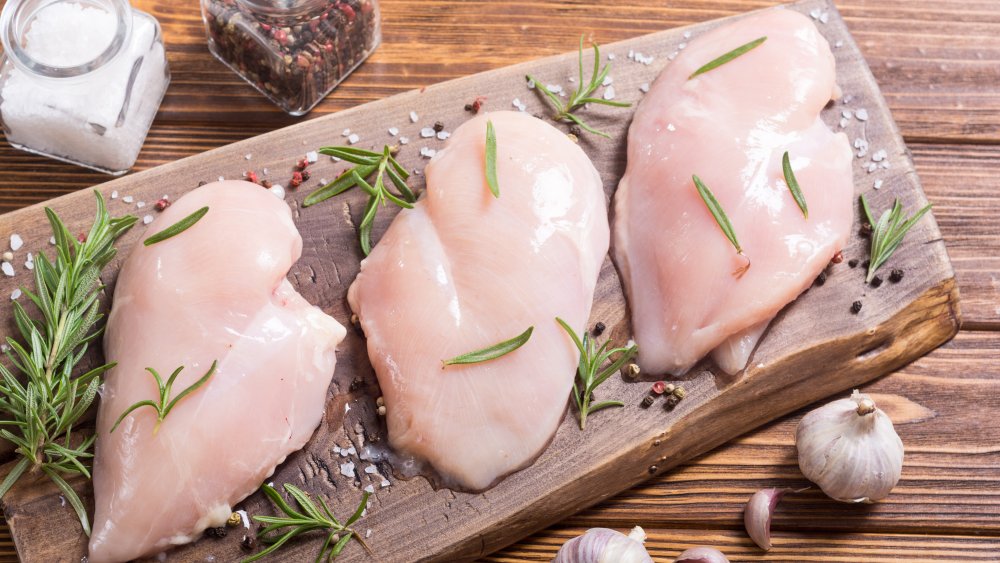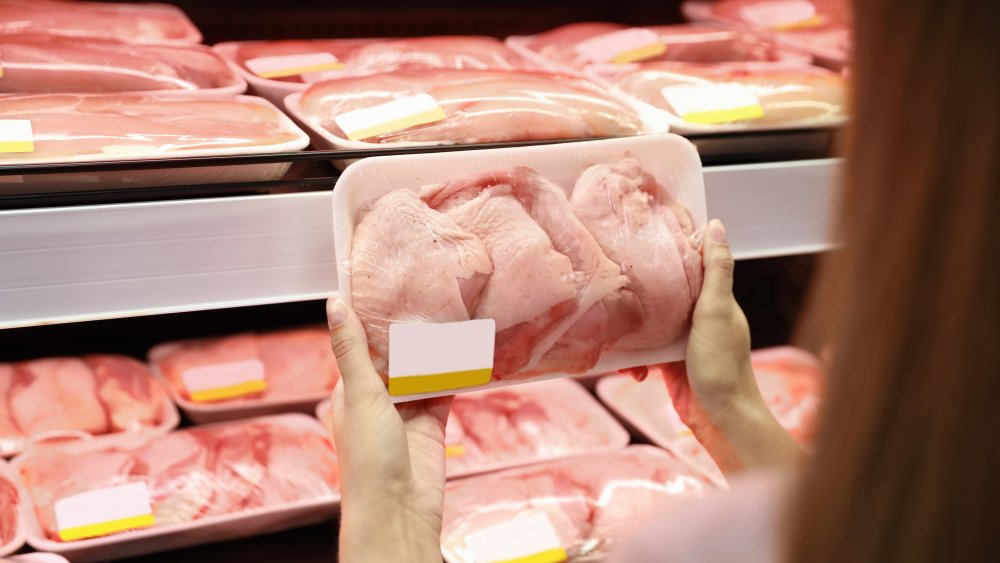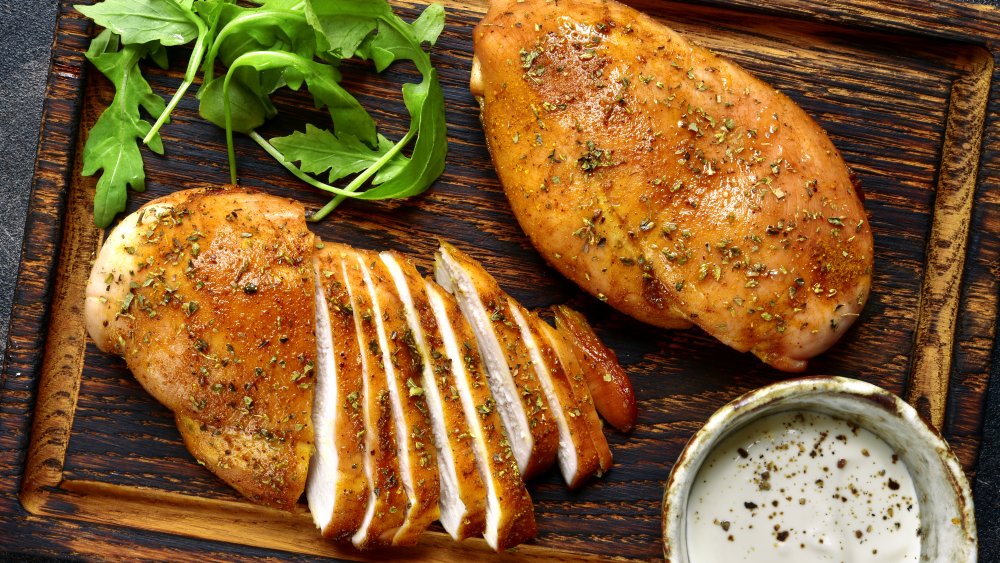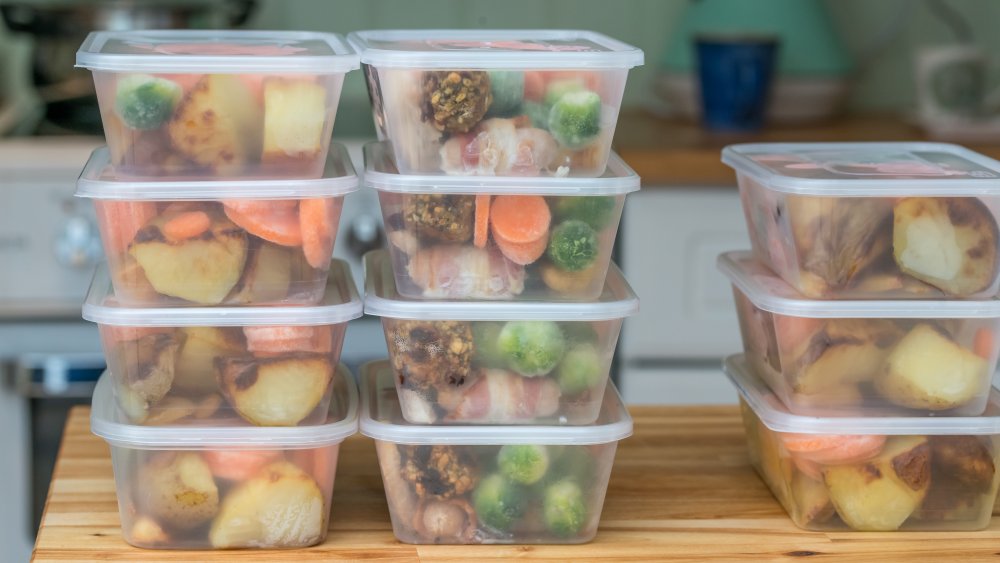The Biggest Mistake You're Making With Chicken Breasts
There's a good reason why skinless chicken breasts are an ingredient in so many healthy recipes; a single 3.5 ounce serving has a whopping 30 grams of lean protein (via MyFitnessPal). And they're so versatile, too—you can add them to almost anything to make the perfect weeknight dinner. If you're batch-cooking for the week, chicken breasts are an obvious choice; they'll be nice with rice on Monday and the starring ingredient of your #TacoTuesday. Toss them with a little garlic and olive oil and boil some pasta, and voila! Wednesday's dinner is served.
Except, you might not even make it past Monday if your chicken tastes like, well, like you're eating your own foot. This is a predicament known across the Internet as #strugglechicken. Coined by healthy recipe YouTuber Fit Men Cook, this term refers to chicken that's "drier than the Sahara desert and tougher than Michelin tires." If you find your batch-cooked chicken in storage containers in the back of your fridge because you just couldn't even and ordered pizza instead, you may be making a common mistake when you're preparing your poultry.
Trouble-shooting your overly dry chicken breasts
If your chickens tastes like an old piece of rubber, your mistake may actually be traced to the poultry you bought at the grocery store. You need to buy chicken that's "air chilled" instead of "water chilled." Chilling is the process used to bring a chicken's temperature down to 40 degrees Fahrenheit or lower within four hours of slaughter, and most poultry plants accomplish this temperature dip by submerging the meat in a large vat of chlorinated water. But air chilling locks in more moisture and flavor (per The Kitchn). Note that this process usually results in a pricier bird.
Your chicken may also be stiff and chewy because you didn't tenderize it. All you have to do is wrap the raw chicken in some paper or plastic wrap, grab a meat mallet, and BAM! BAM! BAM! (via LifeHacker). Of course, both of these missteps become more and more obvious as the week progresses, and your Monday night "meh" chicken becomes "barely tolerable" on Tuesday–and by Friday, when it's dry as a piece of wood, you're considering vegetarianism.
How to cook moist chicken every single time
If you want to have perfectly moist, tender chicken every single time, roasting is a quick way to achieve poultry perfection. Start by brining then drying your chicken, the brush it with a little butter and add any rubs you want to include for flavor. Roast your chicken at 450 degrees for about 15 minutes. Then, restrain yourself before picking up a carving knife, for at least 15 minutes. This final step, according to food blogger Gimme Some Oven, is absolutely critical: "If you give your freshly baked chicken breasts a brief rest, it will finish cooking and lock in all of those delicious juices, resulting in the most tender and juicy and delicious baked chicken," she explained.
Another foolproof option for juicy chicken all week long is to make shredded chicken in an Instapot. You just need a cup of low-sodium chicken broth per 3 pounds of chicken breast, according to Kristine's Kitchen. Cook on high-pressure for 11-18 minutes, depending on how much chicken you're cooking, then quick-release the pressure. You will need to use a fork to break apart the chicken and mix it with the broth.
Keeping chicken juicy all week long
Even if you buy air-chilled chicken breast and do all the right things while you're cooking it, let's be honest: you might not be so excited about your leftovers a few days after your bird's debut at your dinner table. Especially if you make the mistake of microwaving it. (Word to the wise: reheat it using the same technique you used to cook it from scratch.) As the days progress, and your uneaten chicken waits idly in the refrigerator, moisture naturally evaporates. But there are a few ways you can maintain juiciness.
The first is to wait until your freshly cooked chicken has cooled to room temperature before you wrap it up and stick it in the fridge–this will keep it moist for up to four days. And if you're chopping it up into little pieces before you put it in storage containers, put down the knife and back away slowly. Leftover chicken tastes much better when you wait to carve it until right before you're ready to eat it (per Fine Cooking).
If all else fails, you can plunge it into soup or use it to make chicken salad, suggests Spoon University. You can also pan-simmer it in a simple sauce to add back some moisture – pesto, barbecue, a hot-sauce-and-lemon-juice concoction, whatever you fancy. With enough new flavors to distract your taste buds, you might even forget your once-plump poultry has seen better days.



